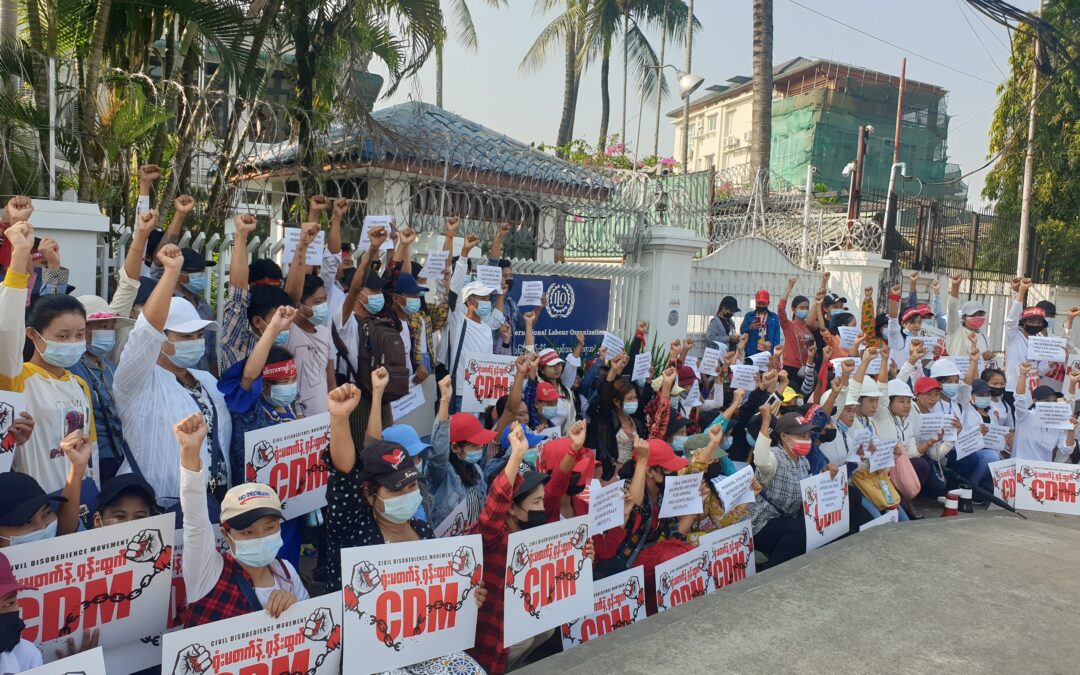
Apr 29, 2021
Two union leaders in Myanmar recently have been arrested for their participation in pro-democracy rallies, and unions worldwide are calling for governments to halt trade and other financial support that provide backing to the country’s military government. The total number of union leaders arrested since the February 1 military coup is at least 20, according to union leaders. (Support workers under attack in Myanmar.)
More than 750 people, including more than dozen union members, have been killed and at least 3,400 people arrested. Union members killed include Chan Myae Kyaw, a union activist and truck driver at a copper mine, who was shot dead while protecting other protestors during a peaceful rally.
Ma Myo Aye, leader of the Solidarity Trade Union Movement (STUM), was arrested at the union’s office in Yangon in recent days and taken to prison by the military. Union leaders say she is charged for allegedly violating Section 505a of the Penal Code, which makes it a crime to cause or intend to cause disobedience or disloyalty to members of the government. Her first court hearing is scheduled for April 29.
She has been transferred to Insein prison in Yangon, which union leaders say is notorious for its torture of prisoners. Myanmar media is reporting horrific sexual assault and other forms of torture against women imprisoned by the military.
Mi Aung, the finance officer of the Hmawbe Brick Factory Union, an affiliate of the Building and Wood Workers Federation of Myanmar (BWFM), was arrested by the army in Hmawbe, where she was visiting her family. Her whereabouts are unknown. The union is vowing to carry on the struggle for democratic freedoms.
The two leaders are among tens of thousands of union members who have taken a leading role in the nationwide Civil Disobedience Movement (CDM) to peacefully protest for an end to the military coup. Union offices have been ransacked and the military has conducted door-to-door searches for union activists, most of whom have now gone into hiding outside Yangon. Arrest warrants have been issued for at least 75 union leaders.
Military Harassing Garment Workers, Union Activists Fired
Garment workers–women in particular–have taken a leading role in the protests, with the country’s 450,000 garment workers especially active in organizing civil disobedience actions and shutting down factories.
In Hlaing Thar Yar, an industrial zone outside Yangon, factories are re-opening despite the dangers to workers. The Industrial Workers’ Federation of Myanmar (IWFM) says the military is arbitrarily stopping workers on the streets, demanding they give their phones to soldiers or face arrest. If they do not have phones, the military requires them to pay a fine. During CDM rallies, the military has killed more than 100 workers in the area, burning some alive, and factories also have been burned, according to the federation.
Yet if workers do not return to their jobs, IWFM says factory management is using their absence to lay off union representatives. Because the military regime cut phone lines and internet access, workers are unable to tell their employers they cannot return to work, and so lose their severance pay.
Unions Worldwide Demand Immediate Action
IWFM and the Federation of General Workers-Myanmar are asking multinational fashion brands to ensure workers can take unpaid leave if they request it because of the lack of safety, and to enable participation in peaceful pro-democracy demonstrations.
Unions around the world are pushing their governments to take immediate action by isolating the military junta and impose sanctions on the Myanmar Oil and Gas Enterprise (MOGE), which provides the military with crucial financing.
The global union movement also is urging international financial institutions to recall all projects and loans to the military government, and initiate dialogue with the National Unity Government, which includes leader Aung San Suu Kyi, who was among elected officials the military arrested.
A coalition of global union federations issued a statement conditionally supporting the Five Point Consensus statement by the Association of Southeast Asian Nations (ASEAN) in which the organization and Myanmar’s junta agreed to a plan to end violence and hold a constructive dialogue among all parties.
While ASEAN’s plan is a good, partial step forward, the union federations say, it omits key concerns.
“A dialogue process will be meaningless if political leaders remain imprisoned and if trade unionists, activists and even health workers who assist the injured, remain at risk of arrest, torture and imprisonment,” the union federations say. “Trade unionists have been arrested, tortured and harassed in door-to-door searches, while others are hiding in fear. The military has imposed widespread restrictions on workers’ rights and curtailed freedoms of speech and assembly, blocked social media and declared 16 labor-related organizations illegal.”
Education International is urging the United Nations Security Council to take stronger action, including targeting military leaders, and asks national governments to use all means available to sanction the military, including through economic pressure.
IndustriALL global union is calling on companies to end commercial ties with the military and urging its affiliates to pressure governments to impose economic sanctions
In New Zealand, the Council of Trade Unions is pushing its government to not ratify the Regional Comprehensive Economic Partnership (RCEP) trade agreement because it includes trade with Myanmar. The Swedish union of forestry, wood and graphical workers called on the country’s Forest Stewardship Council to stop providing certifications to raw materials exported by Myanmar’s military junta.
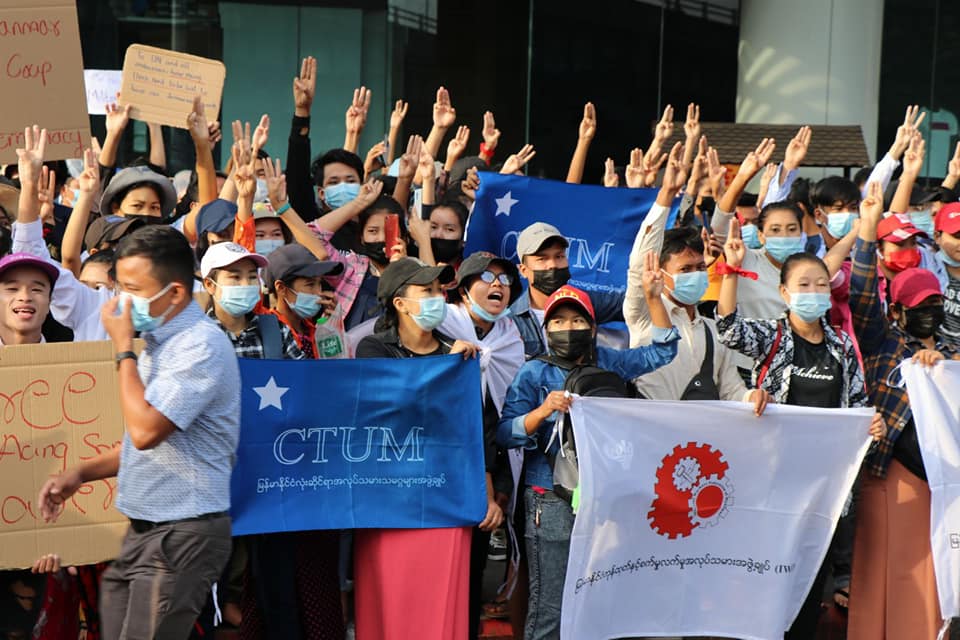
Mar 23, 2021
Nurses, doctors and other health workers rallied in central Myanmar over the weekend, despite the government’s brutal repression against workers peacefully protesting for an end to the military coup launched on February 1.
Military and police have killed at least 249 people and arrested thousands, many of whom are subjected to torture. In February, the military arrested elected officials, including leader Aung San Suu Kyi, and established a ruling junta, declaring a one-year state of emergency, after which an election would be held.
Seeking a return to democratic governance, workers–women in particular–have taken a leading role in the protests, with the country’s 450,000 garment workers especially active in organizing civil disobedience actions and shutting down factories. They are asking international corporate fashion brands to cease doing business in Myanmar until democracy is restored.
Massive industrial factory zones outside Yangon are shuttered, bank employees and port workers have ceased work and other workers across Myanmar have not showed up to their jobs to starve the junta of financial support. (The actions are a hardship for workers who are going without pay. You can help sustain them by contributing to a union-supported campaign here.)
Workers Standing Strong despite Repression
Union leaders have been forced into hiding, and they report military checkpoints along routes out of Yangon where soldiers stop and search cars, looking for passengers who match photos of union leaders.
Workers say the military is widely using live ammunition against civilians. Images of tortured victims are circulating on the internet, as are videos of the military forcing civilians into degrading acts such as crawling in the streets or carrying sandbags until they collapse.
Yet unions refuse to back down and are planning massive demonstrations in coming days to carry on the Civil Disobedience Movement (CDM). Workers say they do not want a return to the repressive days of military rule during which the freedom to form unions and other civil liberties were repressed. Following the more than 20-year military dictatorship, which ended in 2011, workers rushed to create unions and improve their wages and working conditions while having a voice on the job.
Global Community Taking Steps, More Needed
The international community is taking some steps to sanction the junta, although CDM members say much more is needed. On Monday, U.S. Secretary of State Antony Blinken announced new sanctions against members of Myanmar’s military.
The International Trade Union Confederation (ITUC) and UNI Global union released the names of 23 people with close connections to the junta who should be subject to financial sanctions so coup leaders, already subject to financial sanctions, will not use them as proxies.
Meanwhile, the European Union is taking what Burma CampaignUK calls a “pathetically weak and ineffective” action, banning 11 military leaders from vacationing in EU member states, well short of the ban on business with the military Myanmar the CDM seeks.
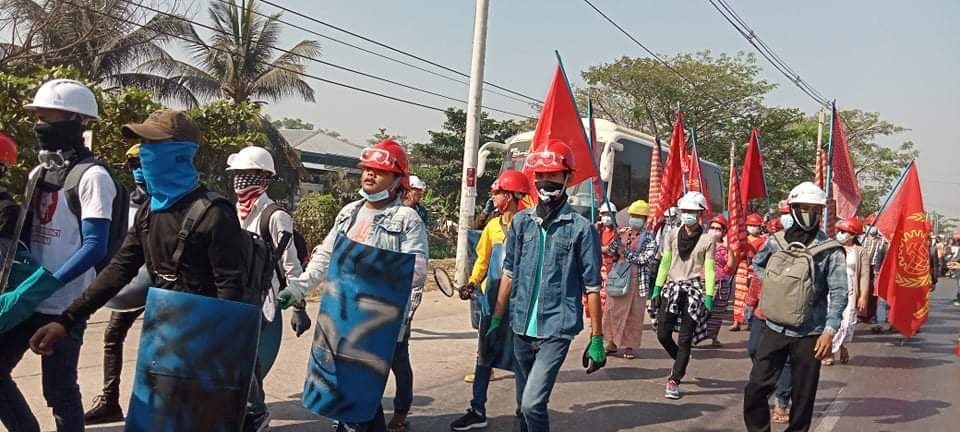
Mar 19, 2021
At least two union members were confirmed killed by the Myanmar military this week and at least six workers were shot dead at the Xing Jia shoe factory in the Hlaing Thar Yar industrial zone Tuesday, according to union leaders. The factory workers, including the woman leader, were shot after the employer called the police when they demanded unpaid wages. Seventy workers were arrested and loaded onto two prisoner trucks.
Union leaders say the police and military violence against protesters in the industrial zones is much worse than is being reported because nationwide internet service repeatedly has been cut, including on Sunday before a violent crackdown.
Also this week, one union leader from the Federation of General Workers Myanmar (FGWM) was arrested while walking to the FGWM office but was released later that night.
Workers Targeted for Standing Up for Democracy
Workers, especially women, have taken a leading role in the civil disobedience movement (CDM) that began February 1, following the military ouster of elected officials, including leader Aung San Suu Kyi. At least 217 people have been killed.
Garment workers, led by women union leaders, have demanded global corporate fashion brands tell factory owners to respect workers’ rights, including the freedom to freely express themselves and peacefully gather.
The Confederation of Trade Unions-Myanmar (CTUM) is requesting international financial institutions freeze all activities in Myanmar, saying all activities with government ministries translate as support for the coup. The CTUM also is calling on companies to protect and respect freedom of association and the rights to assemble and peacefully protest and must help ensure that no worker or union leader will be punished for joining the CDM.
The military is now targeting workers on several fronts, moving into industrial zones and declaring martial law. The military also issued a public statement that public-sector workers must return to work by Monday or they will be criminally charged.
Nearly all factories in the Yangon area, including in major industrial zones, have closed, and union leaders report a mass exodus of factory workers from the industrial zones to their hometown rural villages.
The military is asking factory owners to disclose the names and addresses of trade union leaders to arrest them, and soldiers are going door to door in the worker dormitories and hostels in a bid to find them, according to Khaing Zar Aung, president of the Industrial Workers Federation of Myanmar (IWFM).
Key union leaders of CTUM and affiliated unions were forced into hiding after the military issued a secret list of 27 trade union leaders to be persecute, she writes.
The global labor movement has condemned the military coup, including the International Trade Union Confederation, AFL-CIO and IndustriALL, which called for the immediate restoration of democracy.
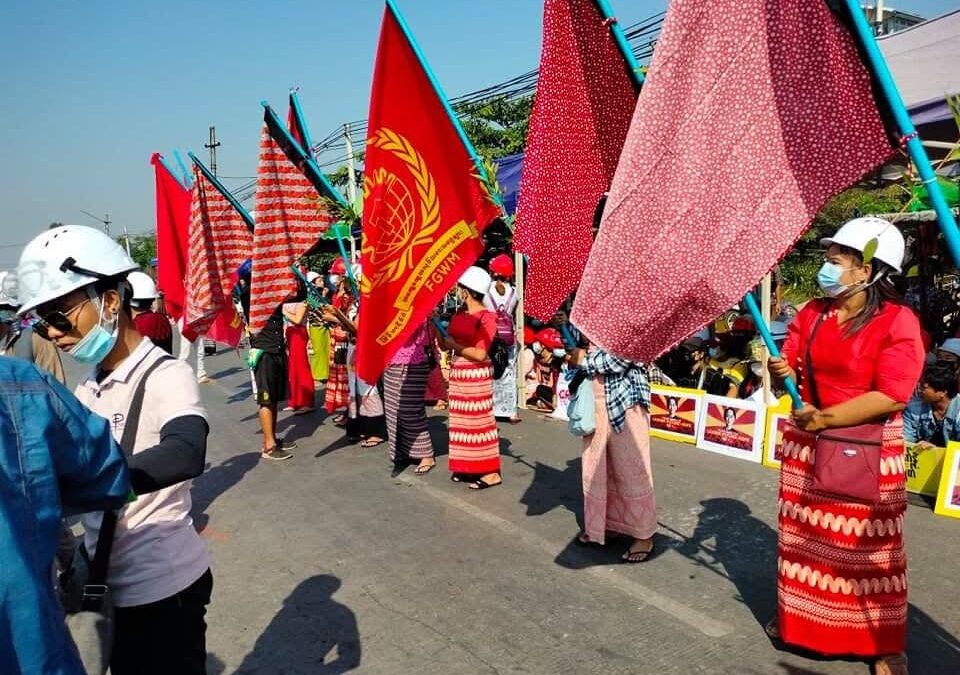
Mar 9, 2021
Trade unions shuttered workplaces and brought thousands of people to the streets Monday in Myanmar, mobilizing a general strike as part of their continued resistance to the military takeover of the government on February 1.
In a statement calling for a nationwide strike on Sunday, the coalition of 18 unions said: “To continue economic and business activities as usual, and to delay a general work-stoppage, will only benefit the military as they repress the energy of the Myanmar people; The time to take action in defense of our democracy is now. The workers of Myanmar are prepared to take action to protect democracy and save our future generations from dictatorship. We believe all Myanmar people are prepared to respond to a call to action.”
In response to worker leadership in the civil disobedience movement (CDM), including other work stoppages, the military has declared at least 16 labor unions to be “illegal organizations” and has arrested or filed arrest orders for at least 71 individual union leaders, sources in the Myanmar labor movement tell the Solidarity Center. In 135 confirmed cases, workers have been fired for participating in street protests, while thousands more have had their factory jobs threatened if they participate further in the CDM.
The unions, mostly led by women, are on the front line with students and broader civil society calling for a return to democracy. For their leadership, they have had their union offices and homes and dormitories, where most garment workers live, raided and warrants for their arrest issued. Over the weekend, according to the Confederation of Trade Unions-Myanmar (CTUM), the military sought to arrest seven labor leaders, five women and two men: CTUM Women’s Committee President Swe Swe Khaing; AMG Garment Factory Union President Thet Mar Soe; Honor Garment Factory Union President, Sai Min Theta; Popular Garment Factory Union Secretary Treasurer Aye Thandar; Industrial Workers’ Federation of Myanmar union organizers San Sen and Myo Min Win; and Ei Ei Hlian, an executive committee member of Charming Garment Factory Union.
More than 60 people have been killed during the brutal crackdown on protesters and nearly 2,000 people have been arrested.
Since the political opening to quasi democracy in 2011, Myanmar has seen rapid growth in foreign direct investment. Major multinational brands source from factories there, with low-paid workers producing garments, footwear, sports equipment, cars and consumer goods. The country logged $4.5 billion in garment exports from October 2019 to July 2020.
Myanmar unions are urging countries and businesses to publicly condemn the coup; to exercise due diligence to ensure no business or investment is linked directly to or associated with the military; to announce that future international investments in the country would be reconsidered if democracy is not restored; ensure that no worker or union leaders are punished for going on strike or joining the current demonstrations against the coup; and to protect and respect freedom of association and the rights to assemble and peacefully protest.
The global labor movement has condemned the military coup, including the International Trade Union Confederation, AFL-CIO and IndustriALL, and called for the immediate restoration of democracy.
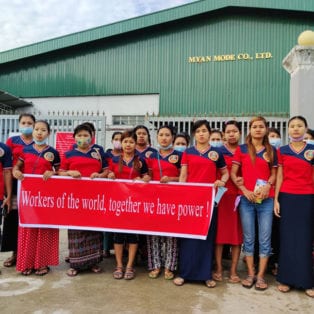
Jun 4, 2020
Workers at the Myan Mode garment factory in Myanmar (Burma) are celebrating the return to the job of many recently fired union members.
Following a two-month fight against the factory’s attempt to use COVID-19 to destroy their union, they won an agreement May 30 that immediately reinstates 25 fired union members and brings back within two months 50 workers who joined strikes to protest the employer’s actions. It also guarantees the recall of hundreds of other fired union members when operations return to normal as the pandemic eases.
In March, Myan Mode permanently fired all 520 union members working in the Yangon factory, citing a decrease in orders due to COVID-19. Yet the owners retained more than 700 non-union workers and continued to operate the factory. The workers were fired minutes after union leaders held a contentious meeting with management in which they demanded an end to mandatory overtime due to fear of contracting COVID-19.
The move has been repeated around the world by employers seeking to use the novel coronavirus pandemic as a means to eliminate unions and weaken workplace rights. In a key provision of the new agreement, the employer agrees to not break the union and that “no discrimination against the union shall occur for any reason.”
“This was not an easy fight,” says Mg Moe, general secretary of the factory-level union, which is affiliated to the Federation of Garment Workers Myanmar (FGWM). “We wanted all our unfairly dismissed union brothers and sisters to be immediately reinstated.”
During negotiations with the union, factory management repeatedly resisted retrenchment plans that would not discriminate against union members. Myanmar authorities and global apparel brands doing business with Myan Mode failed to compel the factory to do otherwise, despite the company’s actions having violated labor law and the brands’ ethical codes of conduct.
‘Our Union Members Stood Strong’
“The central factor in our victory was that our members stood strong”, says Moe Sandar Myint, a union leader at FGWM. “Although we could not achieve full justice, the employer and the brands could no longer ignore our demands entirely. Our workplace union fought doggedly to win the survival of our union, and we now live to fight another day.”
The workers conducted ongoing actions to protest the dismissals, initially staging a five-day sit down at the factory gates but switching to creative uses of social media as authorities banned gatherings due to COVID-19 concerns. Their sustained efforts garnered international media attention and solidarity support from worker advocates around the world, including the Solidarity Center.
“We are also fighting against union-busting in other factories that supply clothes to the same brands that do business with Myan Mode,” says Moe Sandar Myint. “These brands promise to uphold worker rights in their contracts with their factory suppliers but we see little action from them to enforce those commitments. We will continue to struggle against injustice using strong unions in the factories and international solidarity, and will not rest until the entire garment industry is humane for workers.”
To ensure the agreement at Myan Mode is honored, the company has agreed to form a monitoring committee with a third party that is neither the company nor the union. The committee, created in consultation with nongovernmental organizations that include the Solidarity Center, will assess whether laws and company regulations are being followed as dismissed workers are rehired, and it will operate until at least the end of 2020.





